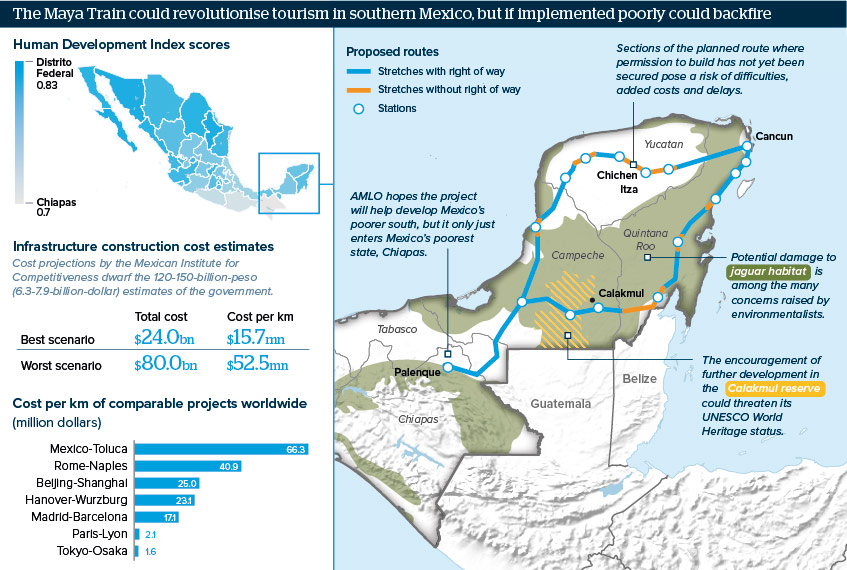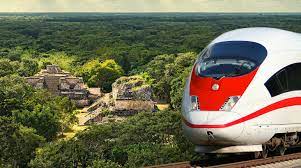The UNWTO said that the Mayan Train will be a success from anywhere in the world that is promoted.
The Mayan Train, the emblematic work of President Andrés Manuel López Obrador for the southeast of Mexico, will triple the arrival of tourists in the region, said Wednesday the secretary-general of the World Tourism Organization (UNWTO), Zurab Pololikashvili.
The representative of the UNWTO arrived in Yucatán this day to visit the most emblematic sites of the Mayan culture, especially those that will be part of the Mayan train itinerary such as the Magical Towns of Maní, Izamal and Valladolid, as well as the archaeological sites of Uxmal. and Chichén Itzá.
“Investing to facilitate the arrival of tourism to the southeast of Mexico will double or triple the flow of national and foreign visitors in the short term,” Pololikashvili told Efe, highlighting the importance of the work.
“It is a great project because it will connect the most important tourist destinations in the Yucatan Peninsula, it will be very successful,” he added.
According to data from the Government of Yucatan, the state broke a tourism record in 2019 by receiving just over 3.2 million visitors
In addition, the UNWTO general secretary said that the Mayan Train “will be a success from anywhere in the world that it is promoted, even from Mexico City with its 25 million inhabitants.”
“It is not easy to connect three key points in the southeast of Mexico, I think the Government has taken a big step with this project that is viable,” he insisted.
Accompanied by the Secretary of Tourism Development of Yucatán, Michelle Fridman Hirsch, and the head of the Secretariat of Tourism of Mexico, Miguel Torruco, Pololikashvili said that his work agenda will address a very important point: the development of rural tourism.
“I believe that Yucatán is one of the best towns that we will have to promote sustainable tourism from Mexico,” he said.
In turn, Fridman Hirsch explained that with the Pololikashvili visit it is intended to create a collaboration agreement for the integration of the Yucatan Tourism Advisory Council as a member of the UNWTO, from which several sustainable and inclusive actions of great impact for the tourism community will emerge. region of”.
The arrival of Pololikashvili to Yucatán is the result of the meetings that Fridman Hirsch held at the International Tourism Fair (Fitur) in Madrid (Spain), where he boasted the region as a destination with great archaeological treasures, Mayan palaces, beaches, magical towns, and medical tourism, as well as sustainability and sustainability projects in cenotes and pre-Hispanic villages.
The secretary of the World Tourism Organization will visit Maní, Izamal, Valladolid, Uxmal and Chichén Itzá this Thursday and Friday, and then go to the neighboring State of Quintana Roo.
On Tuesday, Pololikashvili met with President López Obrador, whom he thanked for facilitating tourism by keeping borders open during the Covid-19 pandemic.
Mexico received 199% more international tourists last April than in the same month of 2020, when there was confinement in much of the world due to the Covid-19 pandemic.
The health crisis was a serious blow to the Mexican tourism industry, which contributes 8.7% of gross domestic product (GDP), and the Government estimates that it will not fully recover until 2023.
However, in 2020 Mexico became the third most visited country in the world, a temporary phenomenon that is attributed to flexible sanitary measures in the country’s tourist areas and to being one of the few countries in the world that did not restrict its borders.
Mexico Maya Train poses major challenges
President Andres Manuel Lopez Obrador (AMLO)’s Maya Train poses serious social, financial and environmental risks

Outlook
Ambitious projects always bring risks, but the Maya Train has added layers of controversy that make it a gamble for the tourism sector.
Mayan complaints of a lack of consultation threaten accusations of cultural appropriation, while environmental concerns regarding deforestation and endangered species are growing, with promises of animal bridges doing little to placate critics.
Government estimates of costs look highly optimistic, and with investor relations under strain, the prospects of delivering the project on time and on budget are dim. AMLO’s refusal to acknowledge legitimate criticism could quickly turn the Maya Train into a major financial burden.
Impacts
- Demonstrations against the train are likely, threatening to slow construction, increase costs, and further taint the project’s reputation.
- Unavoidable deforestation risks undermining the publicity value of AMLO’s tree-planting projects, even if felled trees are replaced.
- Facilitating travel to less-visited Mayan sites may strain resources such as water, necessitating further infrastructure investment.
- If the project proves a success, long-term expansion into Belize and Guatemala may be considered, raising new opportunities and objections.
Source: forbes.com.mx, dailybrief.oxan.com






